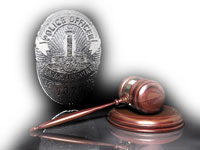–

WASHINGTON (FinalCall.com) – A measure of justice has finally come to the family of a 14-year-old Southeast Washington boy who was shot in the back of the head in September 2007 by one of two off-duty and out of uniform police officers in a dispute over an allegedly stolen mini-bike.
A settlement for an undisclosed amount was announced by government officials on Nov. 10 in the $100 million civil lawsuit against the city and the two police officers. The family of DeOnté Rawlings had sued the city and officers James Haskel and Anthony Clay in connection with the death of the Ballou High School freshman.
Although neither of the officers faced criminal charges for taking the law into their own hands and taking the life of a child, an autopsy from the D.C. Medical Examiner dramatically undermined the account of the shooting from officers Haskel and Clay. The report revealed that the teen was shot in the back of the head, and it also reported numerous unexplained cuts and bruises on the child’s body, and it found no gunpowder residue or soot that might have been left if he had fired a gun, anywhere on the boy’s hands or fingers or clothing.
Mr. Haskel, who said the mini-bike had been stolen from his garage, said Mr. Rawlings got off the bike and fired at him, prompting the veteran officer to fire eight bullets in 5.5 seconds. The child was killed by a single bullet to the back of his head. No forensic evidence tied Mr. Rawlings to the shooting, and no gun was found at the scene.
“I know my son didn’t shoot at them,” Charles Rawlings, the victim’s father, told The Washington Post after the settlement was announced. “Now I’ve got some justice.”
“In order to avoid the uncertainty of litigation … we thought it was in the best interest of the public as well as the Rawlings family to resolve this matter amicably,” D.C. Attorney General Irvin Nathan told the newspaper. “We came to a reasonable compromise. It’s a very sad and unfortunate situation.”
“What the medical examiner talked about in his report is very troubling for the police department,” retired Metropolitan Police Officer Ron Hampton, who was President of the National Black Police Association, told The Final Call at the time of the shooting. “If this officer shot this kid in the back of the head, then, in no way could the kid have been a threat to the officer in that position.”
This deadly incident was Mr. Haskel’s third shooting on the force in 12 years. In the previous shootings, which were not fatal, he also had been off duty and was cleared.
Other disturbing details uncovered by investigations by the FBI and The Washington Post included the facts that: Messrs. Haskel and Clay failed to identify themselves as police officers and didn’t attend to the wounded child after he was shot. The officers also left the crime scene after the shooting without securing it: Mr. Haskel on foot and Mr. Clay driving Mr. Haskel’s vehicle, which he hid at an undisclosed location, taking crucial evidence with him. Mr. Haskel’s SUV had reportedly been hit by a bullet.
The incident prompted D.C. Police Chief Cathy Lanier to issue new guidelines for officers who are victims of non-violent crimes while off-duty. “It’s not standard procedure for an officer to investigate a burglary in his own home,” she said. Still, she added, “I can’t say he was doing anything wrong, looking to see whether the mini-bike had been dumped somewhere.”
The victim’s father does not agree. Charles Rawlings said the officers should not have taken the law into their own hands. “If someone took your bike, you call 911,” he said. “They knew the rules. They knew the law. If they went by the rules, my son would be alive today.”
The conduct of the officers was indeed suspicious. “The policy in the police department has always been–I spent 24 years there and have been gone for now for almost 14,” said Mr. Hampton, “and it’s always been the policy that you don’t police your own stuff, because there’s too much room for conflict of interest. When something happens, what you do is, you call the police.”
The boy’s family insisted that he did not steal the bike or fire the gun. “He didn’t have a gun,” his father said at the time. “My son don’t have no guns,” DeOnté Rawlings’s mother, Loretta Hall said at the time: “He wouldn’t do that. All I would like to do is have some answers.” DeOnté, the youngest of 16 children, was a smart, helpful member of the family, his father said.











